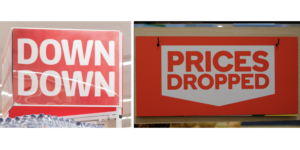Consumer Watchdog Takes Action Against Supermarket Giants for False or Misleading Claims

Supermarket giants Coles and Woolworths control 67% of the Australian retail grocery market – the highest percentage of any developed nation – giving them the power to unfairly exploit producers and set unreasonably high prices for consumers.
One of the marketing tactics employed by these companies is to claim prices have been falling – something which most consumers know just isn’t true.
In the case of Coles, the jingle goes ‘down down, prices are down’ while Woolworths advertises price ‘dropdowns.
But our nation’s consumer watchdog, the Australian Competition and Consumer Commission (ACCC) claims to be onto both companies – launching legal action which claims they have been inflating prices for short periods of time before reducing them to levels above what they were before the increase, then claiming prices have dropped.
The legal action
The Federal Court proceedings claims that Woolworths Group Limited and Coles Supermarket Australia Pty Ltd systematically raised prices on individual items in the order of 15% – impacting suppliers through lower sales – then discounting after a period of typically around six months to a level slightly about the original price, before falsely or misleadingly marketing the price reductions as longer term price reductions.
However, a legal action follows a lengthy ACCC investigation which found that both supermarket chains have a history of price inflation regarding their ‘Prices Dropped’ and ‘Drop Down’ claims in relation to regular supermarket prices.
ACCC Chair, Cass-Gottlieb, issued a press release claiming both companies made ‘misleading claims about discounts, when the discounts were, in fact, illusory.’
Systematic conduct
The ACCC asserts that both corporations have used the tactic for several years, applying it to hundreds of products in their stores in recent times.
The tactics was used for at least 266 products for Woolworths in nearly two years and 245 products for Coles in 1.5 years, giving consumers a false sense of smart spending.
Examples
Examples of the conduct include that from January 2021 until November 2022, Woolworths offered a pack of Oreo cookies for a regular price of $3.50 during a ‘Prices Dropped’ promotion for nearly two years. Then in November 2022, the price was increased to $5.00 for three weeks — a 43% increase. One month later, the ‘Prices Dropped’ discount claimed a 50 cent discount on the higher price, although it was still 29% higher than the initial price.
This is a clear indication that Woolworths attempted to temporarily increase the price of a popular product that consumers would continue to purchase. If it ‘put off’ consumers from purchasing during the price spike, they would return to buying the item during the discounted promotion—with little remembrance of the original price.
Another example of alleged misleading conduct was by Coles from February 2022 to May 2023, when the supermarket giant changed the price of nearly 250 products in its stores and online.
Coles offered Strepsils throat lozenges for $5.50 for almost two years. Then, in October 2022, they increased the price to $7.00 (a 27% increase) for one month. Coles then used the ‘Down Down’ promotion to reduce the price to $6.00 — although this was nearly 10% higher than the original price of $5.50. The temporary price hike was clearly used to give consumers the illusion of a better deal on a product that was lower before the ‘Drop Down’ promotion.
Previous Interventions in the Supermarket Sector
The Australian government directed the ACCC to investigate the supermarket sector, including the relationship between retail, wholesale, and farmgate pricing. The year-long inquiry began on 25 January 2024 and will investigate how pricing and supermarket sector trade have changed since the last inquiry—over 15 years ago.
The time between the last inquiry and the one in the last year highlights the issues with the government’s lack of regulation of supermarket prices. Although the ACCC notes they understand how pricing has continually increased, making it harder for Australians to purchase groceries, the lack of price regulation—and potential deception—is a red flag for Australian citizens.
ACCC Chair Cass-Gottlieb stated that the organization would ‘conduct a detailed examination of the supermarket sector (to) identify problems or opportunities for improvement.’
Even though the chairperson said they were interested in making noticeable changes to supermarket regulation, little changed after the 2008 inquiry. Coles and Woolworths provided ‘undertakings’ to remove leasing restrictions, encouraging supermarket development in economically downtrodden areas.
The inquiry also investigated issues regarding recent shopping trends, such as online grocery shopping, technology changes, introductions of shopping apps, and rewards/loyalty programs.
The most recent inquiry was in response to the Food and Grocery Code of Conduct, which detailed how retailers and wholesalers are supposed to act towards distributors and suppliers. As far back as the beginning of 2024, consumers have stated that supermarkets advertise ‘false/misleading’ pricing.
Misleading or Deceptive Conduct
Coles and Woolworths were both charged with misleading or deceptive conduct regarding commerce and trade within their sectors. This charge states that it is unlawful for businesses to make statements that are deceptive or likely to mislead or deceive. In most cases, supermarket chains cannot rely on fine print or disclaimers as an excuse to provide deceptive content.
Misleading or deceptive ‘conduct’ refers to:
- Advertisements,
- Quotations
- Statements,
- Promotions, or
- Any representation made by a person.
A business can influence how consumers interpret a product or service based on the overarching impression. Even if a consumer understands the full extent of the advertisement or promotion before purchasing, ‘misleading conduct’ can still entice a customer to buy a product they might not have before.
Some common examples of misleading or deceptive claims include:
- Offering rebates, prizes, and free items without providing them,
- Bati advertising,
- Relying on disclaimers and fine print,
- Misleading warranties or claims, or
- Silence or failure to disclose.
In this case, Woolworths and Coles were misleading consumers regarding the pricing of their products, the original price, discounts, and ‘rebates’.
An example of misleading or deceptive conduct dates back to the Australian Competition and Consumer Commission v Coles Supermarkets Australia Pty Ltd FCA 330, which showed that Coles misled customers about bread that was baked in-house, ‘sold today’, or ‘freshly baked’ in-store.
False or Misleading Representations
Coles and Woolworths are also facing ‘false or misleading representations’ charges, which occur when a business makes false representations about goods or services when supplying or promoting them.
A business cannot make false or misleading representations about:
- The standard or grade of goods or services,
- The price of goods or services,
- Whether the goods are new,
- The composition, style, or previous history or use of goods, or
- The buyer’s need for the goods or services.
An example of false or misleading representation occurred in the Australian Competition and Consumer Commission v Pirovic Enterprises Pty Ltd (No 2) case 2014, stating that Priovic inappropriately labelled their eggs for consumer purchasing.
Penalties
Depending on the case and whether the charge is criminal vs. civil, some breaches result in a monetary penalty amount referred to as ‘penalty units’. The value of a penalty unit in NSW is $313. For other more serious charges, according to the Competition and Consumer Act 2010, the maximum penalty for each offence totals $500,000 for an individual.
For body corporate companies, they can be charged the greater of the offences:
- $10 million
- 3x the value of the ‘reasonably attributable’ benefit, or
- 30% of the annual adjusted turnover in the previous year during the breach turnover period.
It is hoped the latest proceedings will stem the misleding price reduction tactic and bring about a situation whereby both suppliers and consumers are provided with honest pricing information.






